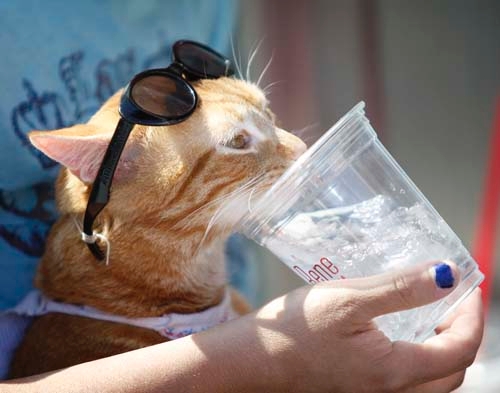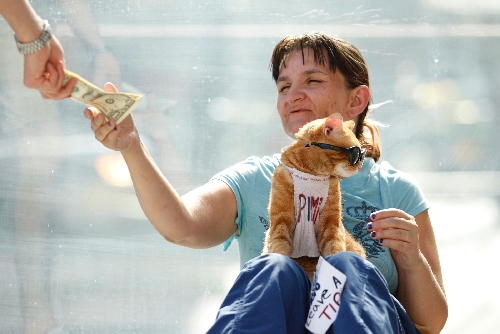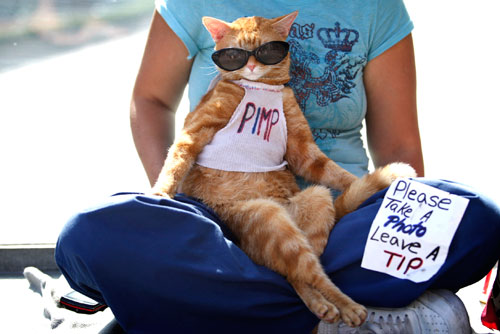Daytime ban against animals on Strip elicits a cat’s yawn
Cheddar the cat peers over his tiny black sunglasses at tourists snapping photos.
The 2-year-old ginger tabby, wearing a homemade tank top that reads "Pimp," sits upright on owner Rebecca Lemon's lap. His legs are crossed.
Lemon, 39, collects dollar bills from the crowd quickly gathering on the footbridge near The Cosmopolitan of Las Vegas. She says she is homeless and trying to make enough money to get a weekly motel room. On a good day they'll pull in $200.
Both seem to work the crowd as well as performers do inside the hotel-casino. Cheddar, whose furry belly is hanging out, rests his paws on Lemon's legs in what looks like some sort of cat meditation pose.
The sun beats down on Lemon, her boyfriend, Nick Tsiomos, 30, and Cheddar, who is now face deep in a cup of ice quickly melting from the 90-degree heat.
It's 2 p.m., which means their tourist magnet photo op is now illegal, according to a law the Clark County Commission passed two months ago that bans animals on Strip public sidewalks and pedestrian bridges from noon to 5 a.m. each day.
Restricted areas include Las Vegas Boulevard from Sahara Avenue to Sunset Road and 200 yards on each side of the Strip.
Some are following the law. Others are not, citing the need for money to keep them alive during the economic downturn. Few citations have been issued to enforce the new rules, but police said they're getting more aggressive.
Lemon, who lost her Summerlin home and her job when the company she worked for went bankrupt, said she knows she's breaking the law but has no other options for income.
"All this does is make criminals out of normal people," Lemon said. "It's doing more harm than good. Hopefully they'll change it."
Commissioners plan to review how the curfew is working each year.
Tsiomos has a message for commissioners.
"Put yourself in our shoes," he said. "You live in this situation and tell me you wouldn't do anything you could for your family. I will not leave her side."
CAN'T FIND WORK
The couple said some people yell at them to get jobs.
"Do you have one for me?" Lemon asks. "I have to do this."
Tsiomos said he has looked but there are few jobs in the county - and even fewer he's qualified for without a college degree. So, he acts as her lookout at times, warning his girlfriend if police are around.
The couple wants to buy a tent to stay at a campground to try to save money. They don't feel safe at homeless shelters because they can't stay together. They're not married - a rule at most shelters for those who want to room together.
At this point in the conversation, Cheddar signals his need to use the bathroom and wanders over with Lemon to a footbridge grate to urinate. When he's done, he scratches at the concrete as if he's trying to cover up his deed in a litter box.
Then, he and Lemon go back to taking photos with tourists.
Earlier in the day, a woman approached the couple to let them know she was irritated that the cat was out in the heat and being used to make money. She pressed further to see if there was any cat food. There was plenty, they said, and told her to leave.
That morning, Ron Bell sat on the footbridge with a small cup for change and his 11-year-old orange tabby cat, Mr. Poop. Law enforcement warned him once about the ban, so Bell said he follows the law and leaves for cooler ground when the sun comes up.
"I don't stay past noon," Bell said. "There's no shade up here. It's too hot. We used to stay out all day before."
TOURIST COMPLAINTS PROMPT LAW
The discussion leading up to the law's creation had its critics, who said the ban unfairly targets homeless people and is unconstitutional. But County Commissioner Chris Giunchigliani, who sponsored the idea, said it had nothing to do with panhandling, which is constitutionally protected speech.
The change in law was prompted by tourist complaints of animal cruelty brought to the Las Vegas Valley Humane Society.
Giunchigliani said the law is working overall because she is noticing fewer animals on the Strip.
"I've had a couple of folks email me," she said. "Tourists are telling me it's been better and they'll come back to town. ... We'll see if the times are right, get through the summer and see if that curfew hour was the right approach."
Shortly after word of the proposal spread, a man was bitten by a dog featured in a news report regarding the curfew and had to get rabies shots. Just two weeks ago, another person was bitten by a dog on the Strip, said Metropolitan Police Department Capt. Todd Fasulo, whose Convention Center Area Command includes the Strip. The owner was arrested.
The law exempts service animals, animals used for law enforcement on the job and animals authorized by a parade permit, special use permit, business license or other written government permission.
Some panhandlers on the Strip have said they will work around the law by claiming their pets are service animals with all of the proper paperwork, making them exempt under the law. Asking for proof of service animal status is illegal under the federal disabilities act.
ENFORCING THE LAW
Animal owners whose pets break curfew could face a misdemeanor charge and be subject to fines and imprisonment, just as they would with any other animal ordinance violation. The first offense is $100, a second offense is $250, and subsequent offenses are $500.
Police gave a six-week warning period to spread the message about the new law, Fasulo said. Since then, officers have written a handful of tickets. There has been a decline in street performers using animals since the law went into effect, Fasulo added.
But panhandlers have increased in the summer weather.
"We're done with warnings," Fasulo said. "The direction I have given my officers is if they come across someone new or tourists, we give a warning the first time. We don't have to do that. Ignorance of the law is not an acceptable defense legally."
So officers will use their discretion about when to write a ticket or take someone to jail.
"We're doing everything we possibly can to give people a break while still enforcing the law that's on the books," Fasulo said.
But Fasulo said he had not heard about Cheddar the cat.
"This is a new one we hadn't seen," Fasulo said. "Obviously, we can't be everywhere, but I don't want the perception we're not paying attention to this stuff."
The feedback from officers, hotels and animal rights activists has been positive, he added.
While Las Vegas police have taken the lead on enforcement, county animal control officers can step in to take a pet away when owners refuse to cooperate, a county spokesman said.
The change in law was one of several recommendations made to commissioners by the Resort Corridor Workgroup, a group of gaming and tourism executives, and assembled by County Manager Don Burnette at the direction of the board. The panel studied issues on the Strip including street performers and newsracks.
An ongoing three-month pedestrian study came from that discussion to determine areas of the Strip with high foot traffic volumes.
Fasulo also sat on the Strip committee.
Commissioners could decide to make more changes to the law once the results of the study are released.
Contact reporter Kristi Jourdan at kjourdan@reviewjournal.com or 702-455-4519.



















